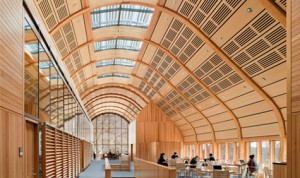 The new home of Yale’s School of Forestry and Environmental Sciences (FES) is Kroon Hall, which is also the greenest and one of the best-looking academic buildings I’ve ever seen. I was there yesterday to give a guest seminar to the FES grad students, a wonderfully eclectic and smart bunch working on projects from an anthropological study of the ocean near Okinawa to evaluating a carbon farming project in Kenya to environmental art and ideas about geoengineering. I’m not sure how much Shakespeare they usually get in those green & glassy halls, but it was a great seminar.
The new home of Yale’s School of Forestry and Environmental Sciences (FES) is Kroon Hall, which is also the greenest and one of the best-looking academic buildings I’ve ever seen. I was there yesterday to give a guest seminar to the FES grad students, a wonderfully eclectic and smart bunch working on projects from an anthropological study of the ocean near Okinawa to evaluating a carbon farming project in Kenya to environmental art and ideas about geoengineering. I’m not sure how much Shakespeare they usually get in those green & glassy halls, but it was a great seminar.
I was invited by Professor Michael Dove,  an anthropologist and social ecologist. I remember coming to his old office when he brought me in the first time in 2008, and seeing the walls covered with ikat hangings and woven baskets from the Dayak people of Borneo, where he’d done field work. I was transported back to my vagabond days in 1990, when, after graduating from college and spending the summer working for the Exxon Valdez cleanup, I spent six or eight months redistributing Exxon’s cash among the Indonesian islands, including Java, Bali, Sumatra, Sumba, Sulawesi, and Borneo. I even hiked up Mt Merapi in Java, the volcano about which Professor Dove has written in the context of cultural responses to natural disasters. I don’t know if that’s why he gave me such a nice introduction, praising my writing and suggesting that my work helps him rethink how we talk about ecological disorder.
an anthropologist and social ecologist. I remember coming to his old office when he brought me in the first time in 2008, and seeing the walls covered with ikat hangings and woven baskets from the Dayak people of Borneo, where he’d done field work. I was transported back to my vagabond days in 1990, when, after graduating from college and spending the summer working for the Exxon Valdez cleanup, I spent six or eight months redistributing Exxon’s cash among the Indonesian islands, including Java, Bali, Sumatra, Sumba, Sulawesi, and Borneo. I even hiked up Mt Merapi in Java, the volcano about which Professor Dove has written in the context of cultural responses to natural disasters. I don’t know if that’s why he gave me such a nice introduction, praising my writing and suggesting that my work helps him rethink how we talk about ecological disorder.
For the seminar, the students had read a sample of my ecocritical articles, some chapters from Shakespeare’s Ocean, and related material from Rob Watson & Bruno Latour. I always am curious about how worldly and non-literary types, including scientists and the policy/managerial scholars at FES, will react to my efforts to make literary analysis matter in ecological terms. There were some skeptical impulses — why such old plays? why not today’s literature? why only English? why not activisim? — and there were some disciplinary fault lines, as when an anthropology student wondered that I could build an argument from a single text, rather than a multitude of response data. But during the seminar, we were all right there together, wanting the same thing — a flexible and powerful language through which to bring together scientists, humanists, and policy makers to address ecological questions. My focus on the post-equilibrium shift is old hat to them, but my claim that early modern ideas about the plasticity of genre can help us generate better narratives about a changing environment is not. We kept coming back to the challenges of representing stasis and change, and human desires for both.
Some of the best questions I got had to do with what literary ecocriticism might say to an audience of environmental policy managers. Michael Dove suggested that literary understandings might help policy stewards de-naturalize their accepted narratives of natural order, which seems right to me, though it puts literary culture in the critique/cautionary position rather than intervening more directly. Is there a more direct story that literary culture can tell about our unstable environment, without falling into old sentimental traps? Are there stories that can emerge from focusing attention on the ocean’s shaping role in our environment — stories about sailors and swimmers, not warriors and kings, as I say in the book — that speak to the needs of FES students, forest managers, and policy makers? Good questions.
Leave a Reply